Election corruption or 'zombie' case? Week 2 of Donald Trump's NY hush money trial begins
Now the real fight starts. After jury selection consumed its first week, Donald Trump’s New York hush money trial moves into opening arguments and witness testimony on Monday about a six-figure payout to block a scandalous story before the 2016 election.
Prosecutors will argue Trump falsified business records to hide his reimbursement to his then-lawyer Michael Cohen for the $130,000 payment to silence porn actress Stormy Daniels, who says she had sex with Trump. Prosecutors contend the payment was a violation of campaign finance law because it prevented an embarrassing story from emerging days before the 2016 election.
A felony conviction could result in a prison sentence, although Trump would be expected to appeal, and it might affect the outcome of the 2024 race.
But Trump's legal team is expected to say in their opening argument that say he didn't know about the payment to Daniels, only that he was paying his lawyer to negotiate a non-disclosure agreement.
“There is no crime,” Trump told reporters last Tuesday during a campaign stop at a Harlem bodega.
Donald Trump trial live updates: Latest from gag order arguments, David Pecker testimony
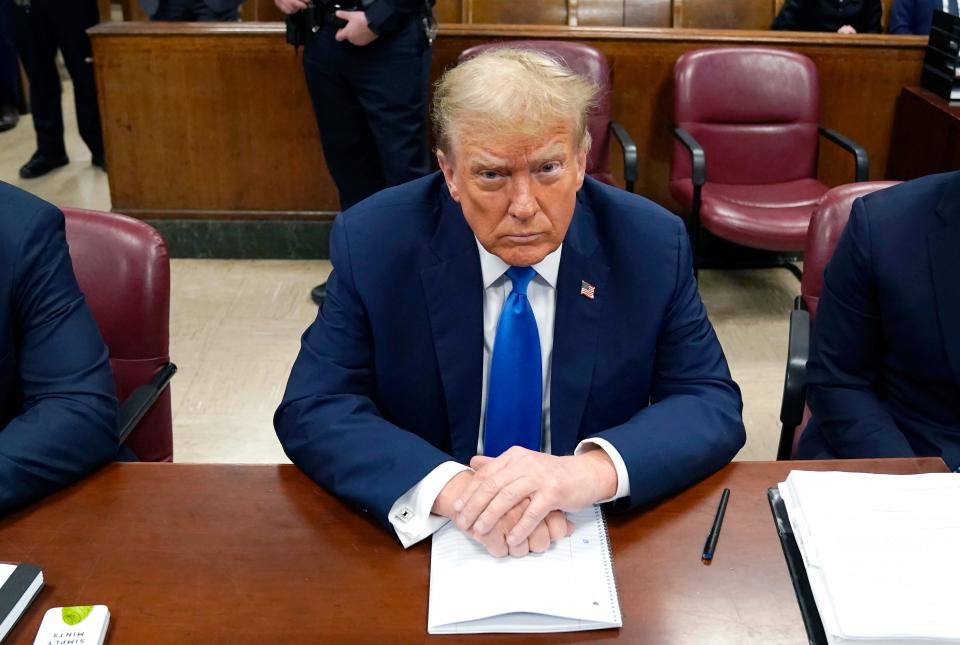
After opening arguments: prosecution witnesses
Prosecutor Joshua Steinglass said he expects to call the first witness Monday.
Trump said at a press conference on the eve of his trial that he will testify in his defense, but he previously backed out of testifying in his defense in a recent New York civil business fraud trial.
Judge Juan Merchan said he would decide Monday what evidence prosecutors can introduce about Trump's "prior bad acts" if he testifies. Prosecutors want to introduce issues from past cases, including his two losses in civil defamation cases to columnist E. Jean Carroll.
Merchan said the trial would work through lunch on Monday and Tuesday and break at 2 p.m. for the Passover holiday.
Part of Tuesday's session will be consumed with arguments about Merchan's gag order prohibiting Trump from commenting on potential witnesses. Prosecutors asked last Monday to fine Trump $3,000 for three alleged violations ? for social media posts about Cohen and Daniels ? and accused him of seven more violations by Thursday.
Prosecutors have refused to divulge to the defense which of the witnesses on the list they already shared will be called on which days because they fear Trump will continue to publicly attack witnesses in an effort to intimidate them. In a compromise agreed upon Friday afternoon, the prosecution said it would provide the name of one witness for Monday on Sunday night, but will not do so again if Trump goes after the person publicly.
Here is what to expect as the trial continues:
Trump case not about 'money for sex': prosecutor
The indictment dryly describes Trump having false entries filled out in a ledger or on a check and stub or as an invoice to the Donald J. Trump Revocable Trust. Nine checks to his former lawyer Michael Cohen were signed by Trump himself.
Trump has pleaded not guilty to 34 counts alleging he falsified business records to hide the payment to Daniels as a legal retainer with Cohen.
Prosecutors are expected to weave a more colorful story that Trump repeatedly and fraudulently falsified the records to hide damaging information from the voting public during the 2016 presidential election.
A key phrase in the indictment is the accusation that Trump falsified the records with the “intent to commit another crime,” which if proven could elevate the charges from misdemeanors to felonies.
"The core is not money for sex," Manhattan District Attorney Alvin Bragg said in a radio interview in December. "We would say it's about conspiring to corrupt a presidential election and then lying in New York business records to cover it up."
Each count carries a maximum four-year sentence, but experts say Trump as a first-time offender is unlikely to get the harshest penalty even if convicted.
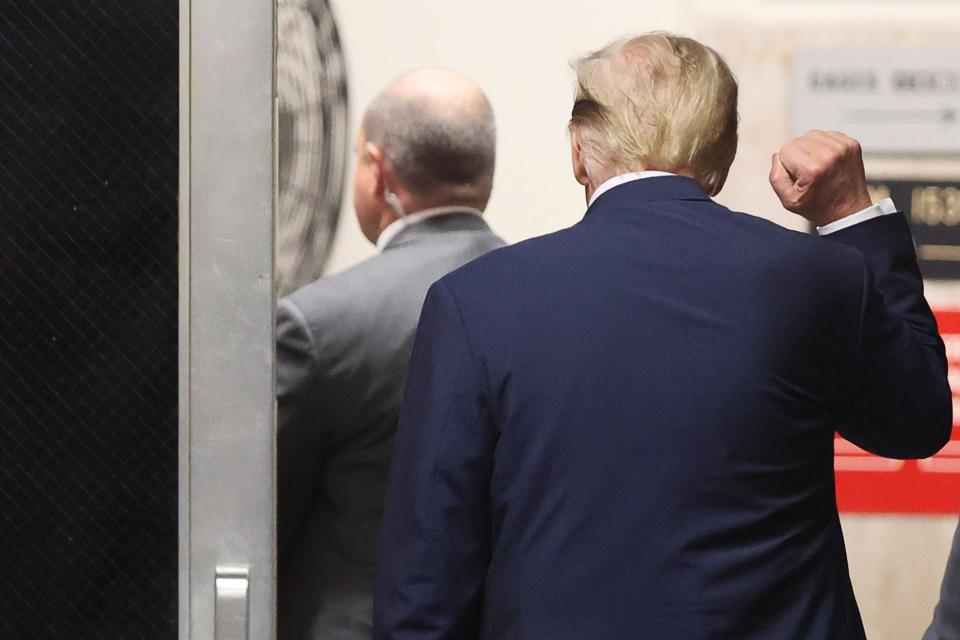
Key witnesses
Michael Cohen, Trump's former personal lawyer, who arranged the payments to silence women and says he did so at Trump's direction in order to influence the election.
Stormy Daniels, a porn actress, who received $130,000 from Cohen to buy her silence about her claim she had sex with Trump once in 2006.
Karen McDougal, a former Playboy model, who received $150,000 from the National Enquirer’s parent company to buy her silence about an alleged affair with Trump.
David Pecker, former president and CEO of American Media Inc., the parent company of National Enquirer, which paid McDougal for her story but didn't publish it.
Hope Hicks, Trump's 2016 campaign press secretary, who denied knowing about payments to kill stories but dealt with Cohen as he negotiated the deals.
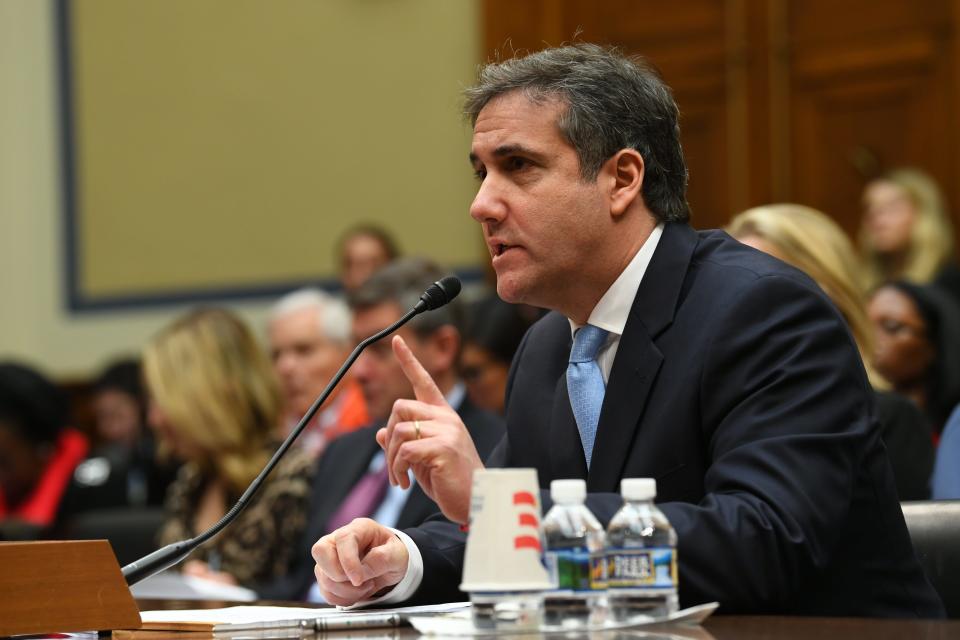
Trump, lawyers blast 'zombie' case
Trump is expected to uncork a full-throated defense. He contends ? as he has in all four criminal cases pending against him ? the trials represent partisan interference in the 2024 election. But Merchan and other judges have swept aside his claims of vindictive prosecution, leaving the case for a jury to decide.
The opening argument from Trump's defense team is expected to track closely to his explanations on social media and in statements to reporters.
The team led by Todd Blanche, Emil Bove and Susan Necheles had blasted the "discombobulated package of politically motivated charges marred by legal defects."
“I was paying a lawyer and marked it down as a legal expense – some accountant, I didn’t know – marked it down as a legal expense,” Trump told reporters Tuesday in the hallway outside the courtroom. “That’s exactly what it was. And you get an indictment over that?”
Trump also noted Bragg's predecessor, Cyrus Vance, and Justice Department investigators ended their inquiry without charges in 2019. Vance “looked at it, took a pass,” Trump said, calling it a "zombie" case for returning from the dead.
He also contends negotiations for a non-disclosure agreement were private and had nothing to do with the campaign.
Cohen: Trump is a 'cheat'
Cohen, who served as a personal lawyer to Trump for a decade, outlined his allegations in blockbuster testimony to the House Oversight and Reform Committee in February 2019.
He described the payment to McDougal as a “catch-and-kill” strategy, to pay off the source so that no derogatory story appeared. He set up a company called Essential Consultants to hide the payment to Daniels.
Cohen testified he was reimbursed $420,000 to cover the Daniels payment, a bonus and taxes. He provided Congress pictures of checks with Trump’s signature.
Cohen was sentenced to three years in prison after pleading guilty to charges including a campaign finance violation. His indictment described the payments as in-kind campaign contributions larger than the $2,700 limit to “prevent (news stories) from influencing the election.”
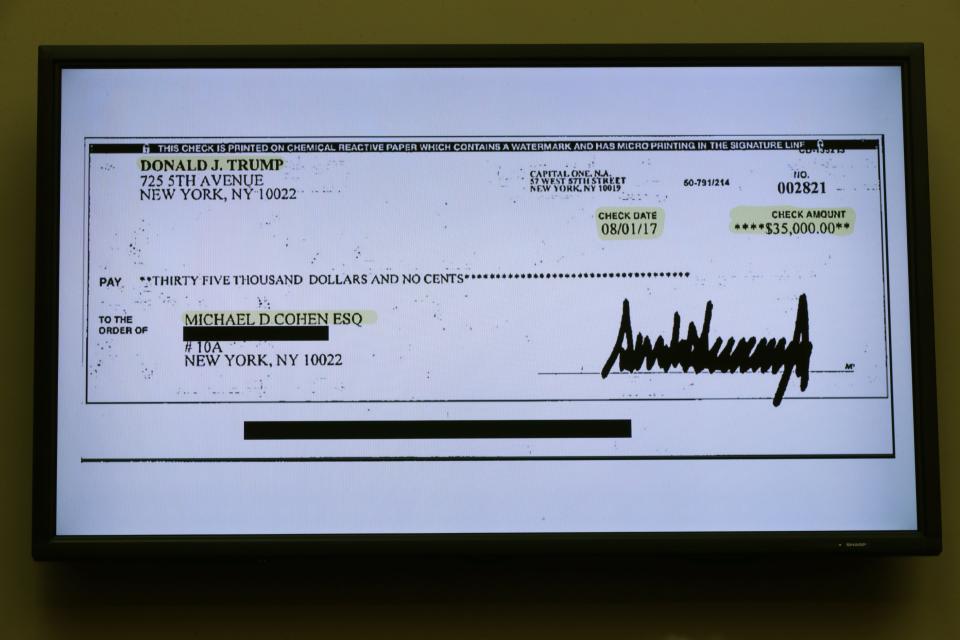
“I am ashamed that I chose to take part in concealing Mr. Trump's illicit acts rather than listening to my own conscience,” Cohen told the House. “I am ashamed because I know what Mr. Trump is. He is a racist, he is a con man, and he is a cheat.”
Trump has called Cohen unreliable and labeled him a "sleazebag" because he was imprisoned for lying to Congress about a Trump real estate project and disbarred.
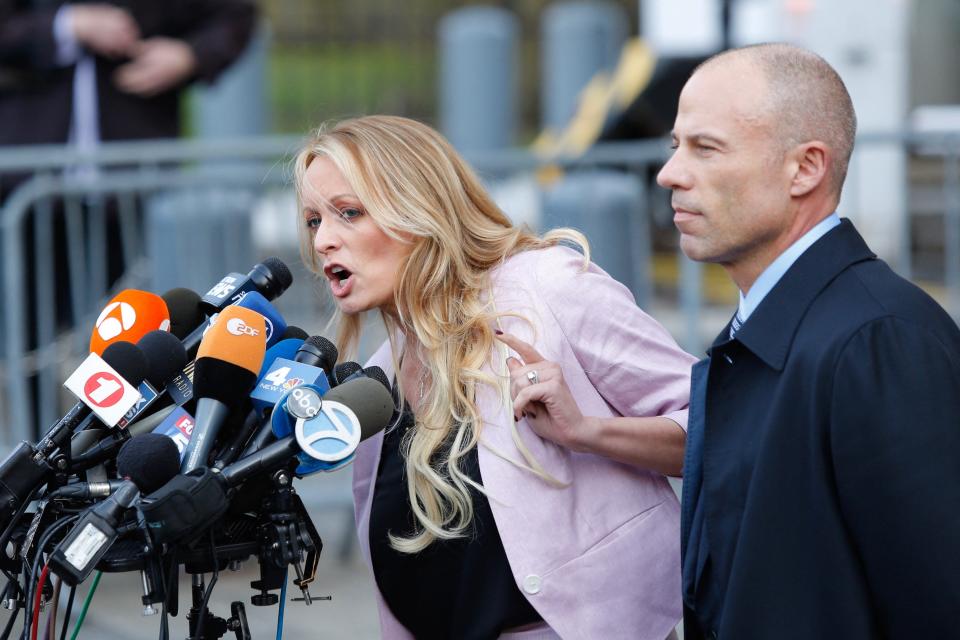
Stormy Daniels says lie detector found her 'truthful'
Daniels, whose real name is Stephanie Clifford, has said the sex happened in July 2006, after a celebrity golf tournament in Lake Tahoe. Trump was married to Melania Trump, who had recently delivered their son Barron Trump.
After The Washington Post released the "Access Hollywood" tape in October 2016, in which Trump described grabbing and kissing women without waiting for consent, Daniels arranged for an interview on "Good Morning America."
Cohen contacted Keith Davidson, the lawyer who represented Daniels and McDougal, to offer $130,000 for a non-disclosure agreement with Daniels. She agreed.
Trump tweeted in May 2018 that Cohen "received a monthly retainer, not from the campaign and having nothing to do with the campaign," as reimbursement for "a private contract between two parties, known as a non-disclosure agreement."
Cohen denied under oath in his House testimony the payments were for a retainer.
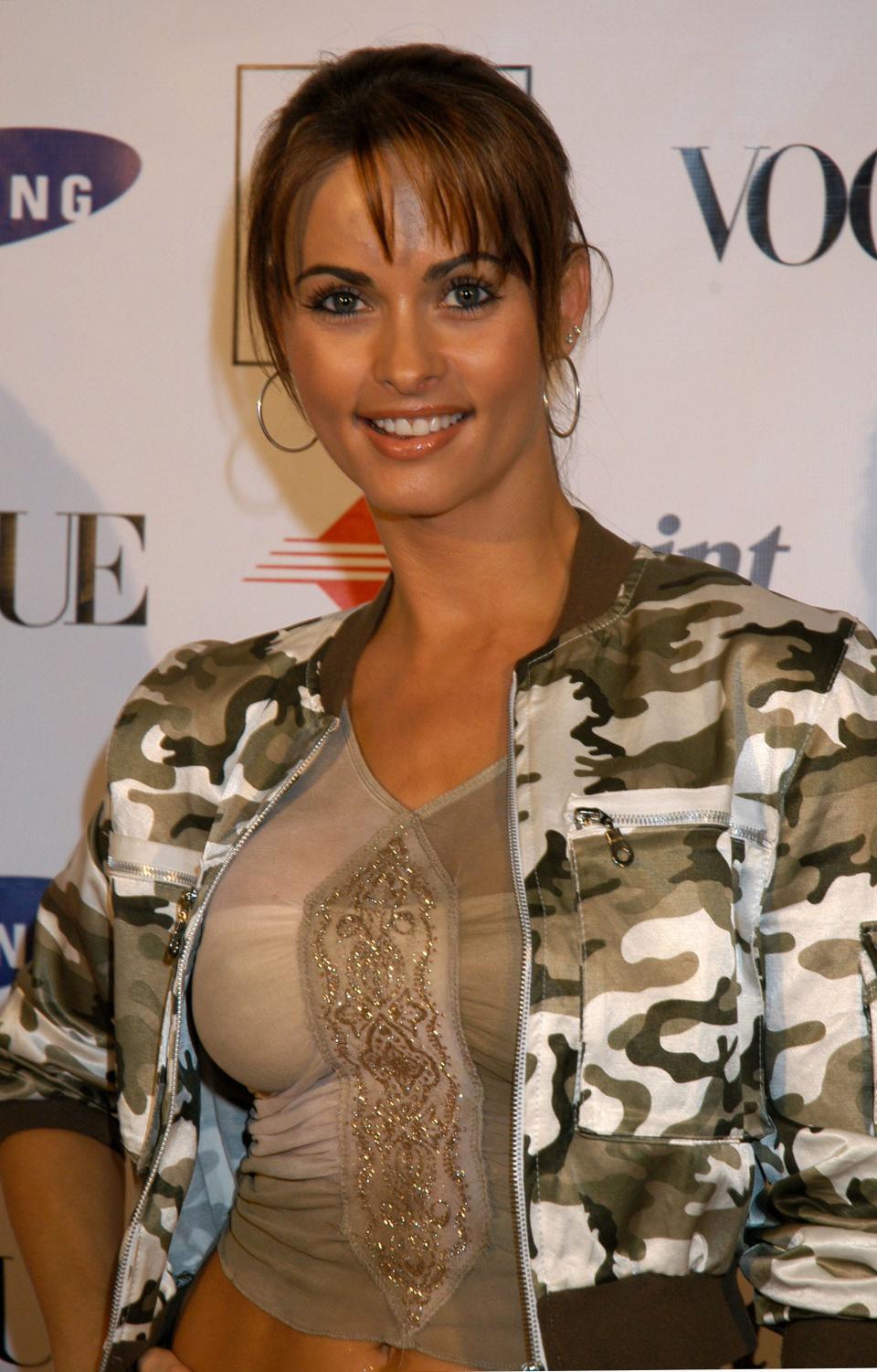
Karen McDougal part of 'catch-and-kill' strategy: Cohen
McDougal was paid $150,000 under an arrangement that also prevented her story from being told, which the Federal Election Commission found violated campaign-finance law.
In June 2016, McDougal’s lawyer Davidson tried to sell her story of an affair with Trump to Dylan Howard, the vice president and chief content officer at American Media Inc. (AMI), which owned the National Enquirer, according to an agreement between the Federal Election Commission and the company.
McDougal entered a contract Aug. 6, 2016, when the company purchased all rights to her “life story” about a relationship with “any then-married man” in exchange for $150,000.
In 2018, the company entered a non-prosecution agreement with the Justice Department and acknowledged the payment was “substantially more than AMI otherwise would have paid for the story” because of Cohen’s assurances the company would be repaid. The company admitted its main purpose was to prevent her story “from influencing the election” and at no time did the company “intend to publish the story.”
AMI paid the FEC a $187,500 civil penalty for an illegal corporate in-kind contribution on June 11, 2021.
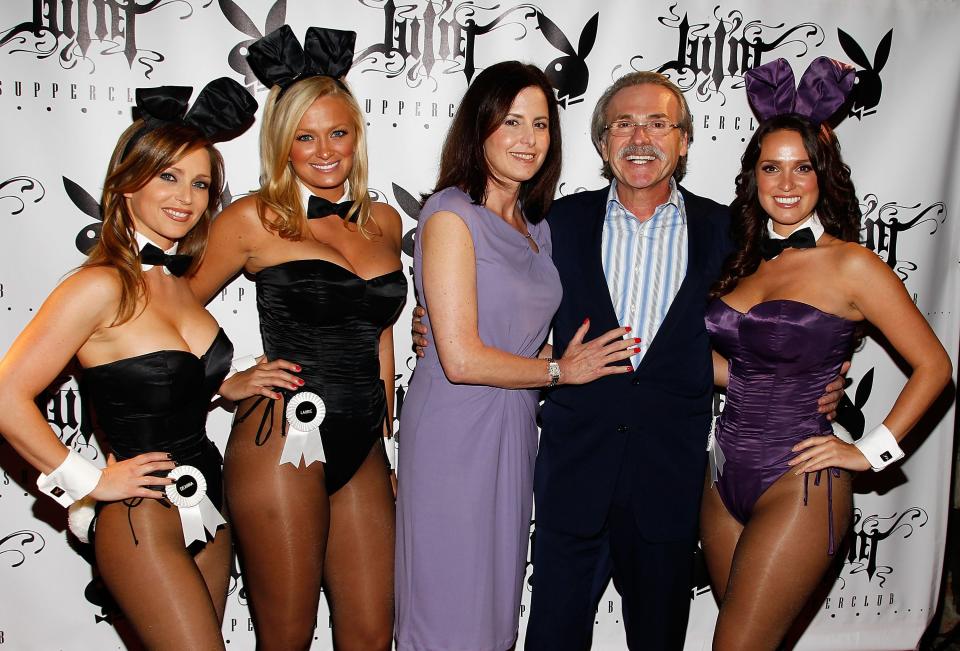
David Pecker led National Enquirer during period FEC fined company for campaign finance violation
David Pecker, who was president and CEO of AMI until 2020, hasn't spoken publicly about the payment to McDougal but could potentially corroborate elements of her story.
Pecker met with at least one member of Trump’s campaign committee and Cohen in August 2015, offering to “help deal with negative stories about Trump” by purchasing them and not publishing them, according to the FEC agreement.
Investigators also found a number of links between Cohen and AMI executives on Oct. 8, 2016, the day after the "Access Hollywood" tape was released, before the agreement with Daniels was negotiated.
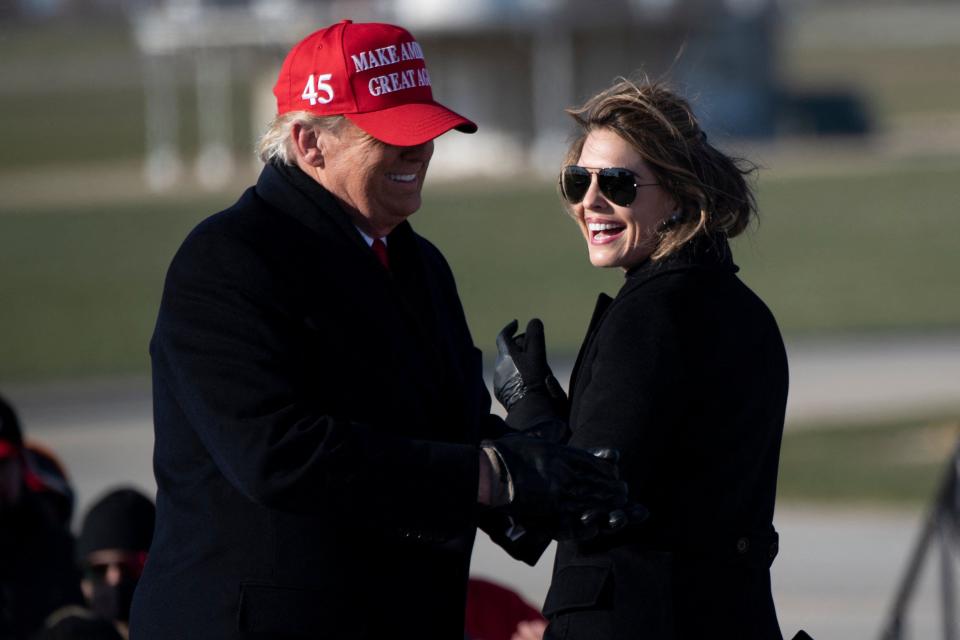
Hope Hicks, Trump spokesperson, could describe campaign response to scandals
Hope Hicks, Trump’s 2016 campaign press secretary, has sworn she didn’t know anything about the payments to stop scandalous stories. But she was in close contact with Cohen as the Daniels payment was negotiated and again as news of McDougal’s payment broke.
On the day after the "Access Hollywood" story broke, Hicks and Cohen spoke three times by phone, including once with Trump joining the call.
The charges left Cohen and Trump bitter adversaries.
“I wasn’t aware of a hush payment agreement,” Hicks told the House Judiciary Committee in June 2019, during an investigation of election interference.
This article originally appeared on USA TODAY: Donald Trump's NY hush money trial: What to expect for week 2
